|
Children's mental health is a critical aspect of their overall well-being, laying the foundation for their emotional resilience and future success. As caregivers, educators, and community members, it's our collective responsibility to provide a nurturing environment that supports children's mental health needs. In this blog post, we'll explore some practical strategies and resources for promoting positive mental health outcomes in children.
Supporting children's mental health is an ongoing journey that requires commitment, compassion, and collaboration from caregivers, educators, and communities. By creating a supportive environment, building healthy relationships, promoting emotional literacy, teaching coping strategies, and seeking professional support when needed, we can empower children to thrive emotionally and reach their full potential. Let's work together to nurture young minds and create a brighter, healthier future for all children.
0 Comments
Embracing Diversity in Mental Health Care: Understanding Cultural Influences in Texas Communities5/6/2024 In the vast landscape of mental health care, it's crucial to recognize the diverse cultural tapestry that shapes the beliefs, practices, and perceptions of individuals seeking support, especially in a culturally rich state like Texas. Understanding and embracing these cultural factors is essential for providing effective and empathetic care to all individuals, regardless of their background. Let's explore some key considerations and strategies for promoting culturally competent mental health care within the diverse communities of Texas. Cultural Factors and Beliefs Religious and spiritual beliefs also play a significant role in shaping mental health perceptions and practices in Texas. Many communities place importance on faith-based coping mechanisms and seek support from religious leaders or community elders during times of distress. Understanding and respecting these beliefs are essential for building trust and rapport with individuals seeking mental health services. Texas is home to a mosaic of cultures, each with its own unique set of values, traditions, and worldviews. These cultural factors significantly influence how individuals perceive mental health and seek support. For example, in some Hispanic communities, there may be a strong emphasis on familial interconnectedness, which can impact help-seeking behaviors and treatment preferences. Similarly, in African American communities, historical experiences of discrimination and stigma may shape attitudes towards mental health care. Practices and TraditionsCultural practices and traditions vary widely across Texas communities and can influence approaches to mental health care. For example, traditional healing practices, such as herbal remedies or ceremonial rituals, may be valued alongside or in place of Western psychiatric interventions in certain communities. It's important for mental health providers to acknowledge and respect these practices while also ensuring that they align with evidence-based treatment approaches. Language and CommunicationLanguage barriers can present significant challenges in accessing mental health care for many diverse communities in Texas. Providing services in multiple languages and employing interpreters when necessary can help bridge this gap and ensure effective communication between providers and clients. Additionally, understanding cultural nuances in communication styles, such as indirect communication or nonverbal cues, is essential for building rapport and understanding clients' needs. Promoting Culturally Competent CarePromoting culturally competent mental health care requires ongoing education, reflection, and collaboration within the field. Mental health providers in Texas can enhance their cultural competence by:
Embracing diversity in mental health care is not just a moral imperative but a necessity for providing quality services to all individuals in Texas. By understanding and addressing the cultural factors, beliefs, and practices that influence mental health care within diverse communities, we can promote equitable access and foster healing and resilience for all Texans. Let's continue to strive towards a future where cultural competence is the cornerstone of mental health care delivery. Blue-collar workers are the backbone of our economy. From electricians keeping the lights on to construction crews building our cities, these jobs require dedication, skill, and often, a lot of physical resilience. But what about mental resilience?
The Pressure Cooker: Common Stressors in Blue-Collar Jobs While the physical demands are undeniable, blue-collar workers often face a unique set of mental stressors: Physically Demanding Work Repetitive motions, heavy lifting, and working long hours can lead to fatigue, pain, and a higher risk of injuries. This physical strain can easily spill over into mental stress. Tight Deadlines and Safety Concerns Meeting deadlines while adhering to safety protocols can create a constant pressure cooker environment. The fear of mistakes or accidents can weigh heavily. Unpredictable Schedules Shift work, overtime, and on-call shifts disrupt work-life balance and make it difficult to plan for personal commitments. Limited Control and Autonomy Many blue-collar jobs involve following set procedures and instructions with minimal decision-making power. This lack of control can be demotivating and lead to feelings of frustration. Financial Strain Blue-collar jobs often come with lower wages and fewer benefits, leading to financial insecurity and anxieties about job security. The Impact of Stress: It's Not Just in Your Head Chronic workplace stress can have a significant impact on a blue-collar worker's well-being, both physically and mentally. Here are some potential consequences:
Building a More Resilient Workplace Employers can play a crucial role in reducing stress for their blue-collar workforce:
Taking Charge of Your Well-Being: Tips for Blue-Collar Workers
Blue-collar workers deserve a safe and healthy work environment. By recognizing the challenges of workplace stress and working together, employers and employees can build a more resilient and thriving workforce. April showers bring May flowers, but for many, they also bring a storm of emotions. In honor of National Poetry Month and our commitment to mental health awareness, Helen's Project is proud to share the power of poetry as a tool for healing and self-expression. In the kaleidoscope of life, we often find ourselves tangled in the intricate threads of our minds. Mental health struggles can cast a shadow over even the brightest days, leaving us feeling isolated and unheard. But poetry has the remarkable ability to illuminate the darkness and give voice to our innermost thoughts and feelings. Through the rhythmic cadence of words, poetry transcends barriers of language and stigma, offering solace and solidarity to those navigating the labyrinth of mental illness. Each verse becomes a lifeline, weaving a tapestry of shared experiences and emotions that remind us we are not alone. National Poetry Month is not just about celebrating the art form itself; it's also an opportunity to harness the therapeutic benefits of poetry for mental health awareness. Here's why highlighting this connection is important: Expression of EmotionsPoetry provides a safe outlet for individuals to express complex emotions that may be difficult to articulate verbally. By encouraging people to engage with poetry, we empower them to explore and process their feelings in a creative and cathartic way. Validation of ExperiencesMental health struggles can often make individuals feel isolated and misunderstood. Poetry, with its ability to capture universal themes and experiences, validates the lived realities of those grappling with mental illness. By showcasing poems that resonate with diverse emotions and experiences, we affirm the validity of each person's journey. Community BuildingSharing poetry fosters a sense of connection and belonging within communities. By creating spaces where individuals can come together to read, write, and discuss poetry, we cultivate a supportive environment where people feel heard and valued. This sense of belonging is essential for combating the feelings of loneliness and isolation that often accompany mental health challenges. Promotion of Self-ReflectionPoetry encourages introspection and self-reflection, prompting individuals to explore their thoughts, beliefs, and experiences in depth. By engaging with poems that touch on themes of resilience, hope, and healing, people can gain insights into their own coping mechanisms and strengths, empowering them to navigate their mental health journey with greater self-awareness and agency. Destigmatization of Mental IllnessPoetry has the power to challenge stereotypes and misconceptions surrounding mental illness. By sharing poems that depict the human experience in all its complexity, we contribute to the destigmatization of mental health issues and promote a more inclusive and compassionate society. Through poetry, we can dismantle barriers to understanding and foster empathy and acceptance for individuals living with mental illness. At Helen's Project, we believe in the transformative power of creativity as a catalyst for healing. Whether through writing, reading, or simply listening to poetry, we invite you to join us in fostering a community of compassion and understanding.
This National Poetry Month, let us embrace the beauty of vulnerability and celebrate the resilience of the human spirit. Together, let's raise our voices and shine a light on mental health awareness—one poem at a time." In summary, National Poetry Month provides a unique platform to raise awareness about mental health by harnessing the healing power of poetry. By celebrating poetry as a tool for self-expression, connection, and empowerment, we can foster greater understanding, support, and acceptance for those affected by mental illness. ADHD (Attention Deficit Hyperactivity Disorder) can feel like a whirlwind for kids and parents alike. But for children in low-income communities, ADHD can come with an extra layer of challenges.
Why ADHD Might Be More Common in Low-Income Communities Attention-deficit/hyperactivity disorder (ADHD) is a common neurodevelopmental condition that can impact a child's focus, impulsivity, and activity level. While ADHD can affect anyone, research suggests a link between ADHD and children from low-income communities. Here's a closer look at this connection: Higher Rates of Diagnosis Studies have shown that children in low-income families are diagnosed with ADHD at a higher rate than children from wealthier backgrounds. This doesn't necessarily mean there's more ADHD in low-income communities, but it raises questions about access to diagnosis and potential misdiagnosis. Challenges Faced by Low-Income Families Children experiencing poverty may face stressors like unstable housing, food insecurity, or exposure to violence. These challenges can mimic symptoms of ADHD, making it difficult to distinguish between the condition and environmental factors. Limited Access to Resources Diagnosing ADHD often involves a combination of evaluations by medical professionals and specialists. Low-income families may have difficulty affording these evaluations or may not have access to qualified professionals in their area. Beyond the Diagnosis: What can be done?
ADHD is a complex condition, and the reasons behind the link to socioeconomic status are still being explored. If you're concerned about your child's development, talk to their doctor. They can help you understand your child's needs and explore potential causes for any challenges they might be facing. It's Not Just About Labels: The goal isn't just about getting an ADHD diagnosis. It's about understanding a child's unique needs and providing the support they need to thrive. As April gently unfolds its petals, it unveils a poignant reminder: Stress Awareness Month. At Helen's Project, we welcome this opportunity with open arms, diving headfirst into the realms of relaxation, rejuvenation, and resilience. Join us on this transformative journey as we explore innovative ways to bid adieu to stress and embrace the serenity within. Stress – a ubiquitous companion in our modern lives, often lurking in the shadows, ready to pounce when least expected. It manifests in various forms, from the pressures of work deadlines to the demands of personal relationships. But amidst the chaos, lies the potential for growth and self-discovery. This month, we invite you to embark on a voyage of self-care and introspection. Let us be your guide as we navigate the turbulent waters of stress and emerge on the shores of tranquility. Here's what you can expect from our Stress Awareness Month initiatives:Mindful MomentsIn a world that never seems to slow down, carving out moments of mindfulness is paramount. Join us for daily mindfulness exercises designed to ground you in the present moment and cultivate a sense of inner peace. Wellness WorkshopsKnowledge is power, and our lineup of wellness workshops is designed to equip you with the tools you need to combat stress head-on. From yoga and meditation to stress management techniques, there's something for everyone on this journey to wellness. Community ConnectionThey say a problem shared is a problem halved, and we couldn't agree more. Join our online community of like-minded individuals as we support each other through the ups and downs of stress awareness month. Together, we can weather any storm. Self-Care SundaysSundays are for self-care, and we're taking this mantra to heart with our weekly self-care Sundays. Please tune in for a day of pampering, relaxation, and rejuvenation as we prioritize our mental and emotional well-being. Reflection and ResilienceAs the month draws to a close, take some time to reflect on your journey. Celebrate your successes, acknowledge your challenges, and commit to cultivating resilience in the face of adversity. Remember, it's not about eliminating stress entirely but learning to navigate it with grace and resilience. So, are you ready to embark on this journey with us? Let's embrace serenity together and discover the transformative power of self-care and resilience. Here's to a month filled with relaxation, rejuvenation, and a renewed sense of purpose. Happy Stress Awareness Month from all of us at Helen's Project!
At Helen's Project, we understand the profound impact that animals can have on our mental well-being. From the unconditional love of a loyal companion to the soothing presence of a purring cat, pets play a vital role in supporting our emotional health. Today, we explore the therapeutic benefits of pets and how they can provide comfort, companionship, and joy to those struggling with mental health issues. Companionship in SolitudeFor many individuals dealing with anxiety, depression, or loneliness, pets offer constant companionship and unconditional love. Their presence provides a sense of comfort and security, easing feelings of isolation and offering a source of emotional support during difficult times. Whether it's a wagging tail greeting you at the door or a gentle purr nestled in your lap, pets remind us that we are never truly alone. Stress Relief and Relaxation The simple act of petting a dog or stroking a cat has been shown to reduce stress and lower blood pressure. Interacting with animals can trigger the release of oxytocin, a hormone known for its calming and bonding effects, helping to alleviate feelings of anxiety and tension. Taking a leisurely stroll with your canine companion or spending quiet moments cuddled up with your furry friend can provide a much-needed respite from the demands of daily life. Encouraging Routine and Responsibility Caring for a pet can instill a sense of purpose and structure, especially for those struggling with mental health challenges. The daily tasks of feeding, grooming, and exercising a pet provide a routine that promotes stability and self-discipline. Additionally, the bond formed between pet and owner fosters a sense of responsibility and accountability, encouraging individuals to prioritize their own well-being as they care for their beloved animal companion. Emotional Support Animals (ESAs): A Lifeline for Mental Health For some individuals coping with severe emotional or psychological disorders, an Emotional Support Animal (ESA) can be a vital component of their treatment plan. An ESA is a companion animal that provides therapeutic benefits to its owner through companionship, affection, and emotional support. With an ESA letter from a licensed mental health professional, individuals can enjoy certain privileges, such as housing and travel accommodations, that help facilitate their ability to live and function independently.
At Helen's Project, we recognize the importance of fostering positive relationships between individuals and their pets. Whether you're seeking comfort, companionship, or emotional support, the bond you share with your furry friend can be a powerful source of healing and strength. If you believe that an Emotional Support Animal could benefit your mental health journey, we encourage you to reach out to a qualified mental health professional to explore your options and learn more about the ESA certification process. Together, let's celebrate the transformative power of pets and their ability to uplift our spirits, soothe our souls, and enrich our lives in countless ways. In today's fast-paced and demanding work environments, stress has become a common companion for many employees. From looming deadlines to heavy workloads, navigating workplace pressures can often feel overwhelming. However, with the right strategies and mindset, it's possible to transform burnout into balance and cultivate a healthier relationship with stress. In this blog post, we'll explore practical techniques for managing stress in the workplace and achieving a greater sense of equilibrium in your professional life.
Strategies for Managing Stress in the Workplace
Remember that prioritizing your mental and physical health is essential for long-term success and happiness in both your professional and personal life. Start incorporating these practices into your daily routine today and take proactive steps towards a healthier, more balanced life. Stay tuned for insightful discussions, heartfelt stories, and valuable resources to inspire and support you on your journey through mental health awareness. For more tips and resources about mental health, visit Helen's Project. 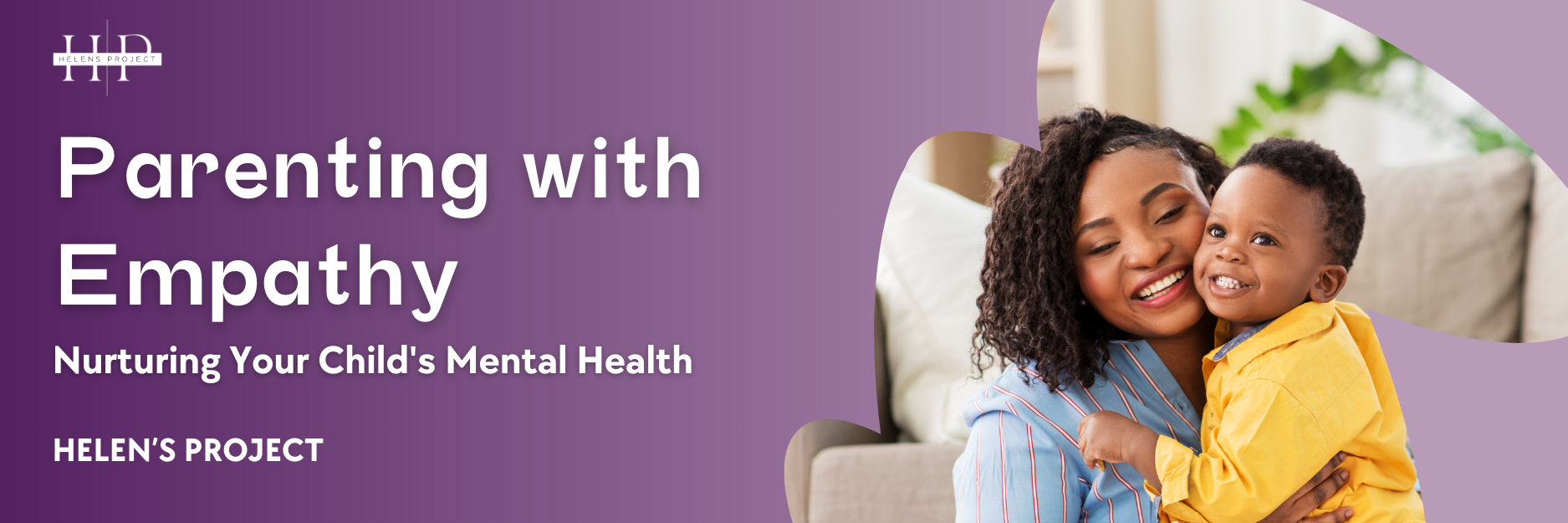 Parenting is a journey filled with joys, challenges, and endless learning opportunities. From the moment we hold our newborn in our arms, we embark on a transformative voyage filled with love, laughter, and countless precious moments. Yet, alongside the joys come inevitable challenges, testing our patience, resilience, and unwavering commitment to nurturing and guiding our children. As caregivers, one of our most important roles is nurturing our child's mental health with empathy and understanding. In this blog post series, we delve into the intricate tapestry of parenthood, exploring the highs and lows, the triumphs and tribulations that come with raising children. From navigating the sleepless nights of infancy to navigating the complexities of adolescence, we share insights, anecdotes, and practical tips to support and empower parents on their journey. Here are some simple tips to help you support your child's emotional well-being:
As parents, we play a vital role in shaping our children's mental health and overall well-being. By approaching parenthood with empathy, understanding, and patience, we can create a nurturing environment where our children thrive emotionally and mentally. Remember, parenting with empathy is an ongoing process that requires patience, understanding, and unconditional love. By prioritizing your child's mental health and emotional well-being, you are laying the foundation for a happy, healthy, and resilient future. Stay tuned for insightful discussions, heartfelt stories, and valuable resources to inspire and support you on your journey through parenthood. For more tips and resources on parenting with empathy and nurturing your child's mental health, visit Helen's Project. Remember, you're not alone on this journey. Together, we can raise emotionally resilient and happy children. Art has long been recognized as a powerful medium for self-expression, communication, and healing. In recent years, art therapy has emerged as a distinct form of psychotherapy that harnesses the creative process to promote emotional well-being and mental health. In this blog post, we'll delve into the transformative potential of art therapy, exploring its benefits, techniques, and applications in supporting mental wellness. Understanding Art Therapy Art therapy is a therapeutic approach that utilizes the creative process of making art to explore and address emotional, psychological, and social issues. Unlike traditional talk therapy, which relies primarily on verbal communication, art therapy provides individuals with an alternative means of expression through various art modalities, such as drawing, painting, sculpting, and collage. The Benefits of Art Therapy Art therapy offers a wide range of benefits for individuals of all ages and backgrounds. Some of the key advantages include:
Techniques and Approaches in Art Therapy Art therapy encompasses a variety of techniques and approaches tailored to the unique needs and preferences of each individual. Some common techniques include:
Art therapy offers a unique and powerful approach to promoting mental wellness and emotional healing. By harnessing the creative process, individuals can explore, express, and transform their inner experiences in a supportive and nonjudgmental environment. Whether used as a standalone therapy or as a complement to traditional talk therapy, art therapy has the potential to unlock new avenues of self-discovery, empowerment, and resilience. Ultimately, it celebrates the inherent creativity within each of us and invites us to embark on a journey of self-expression, healing, and growth through the transformative power of art. If you'd like to explore the wonders of art therapy, book an art therapy session through Helen's Project. |
Archives
May 2024
Categories |

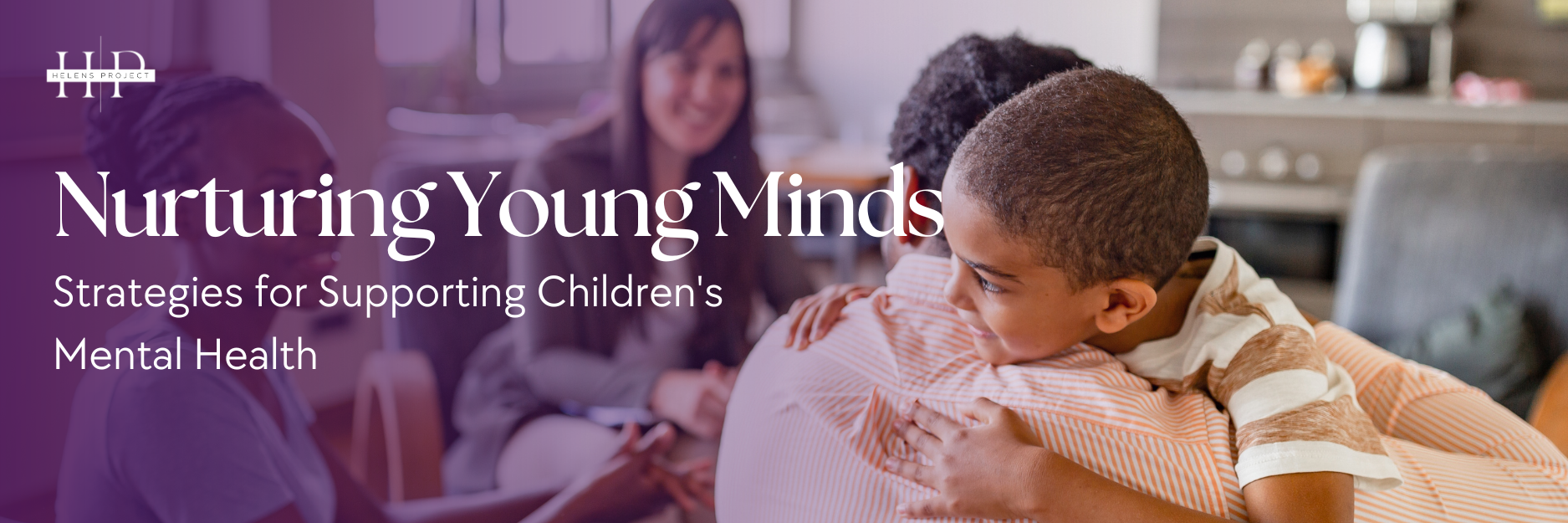

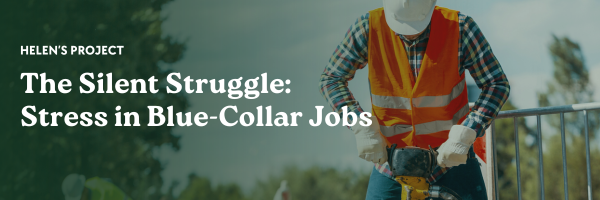




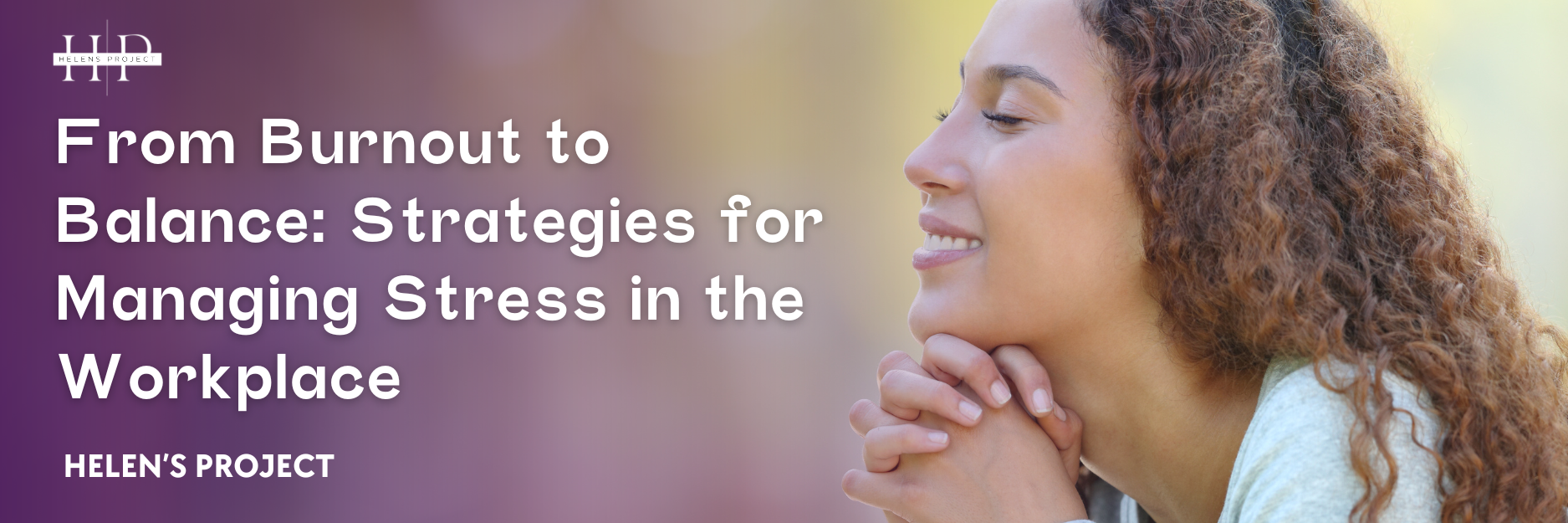

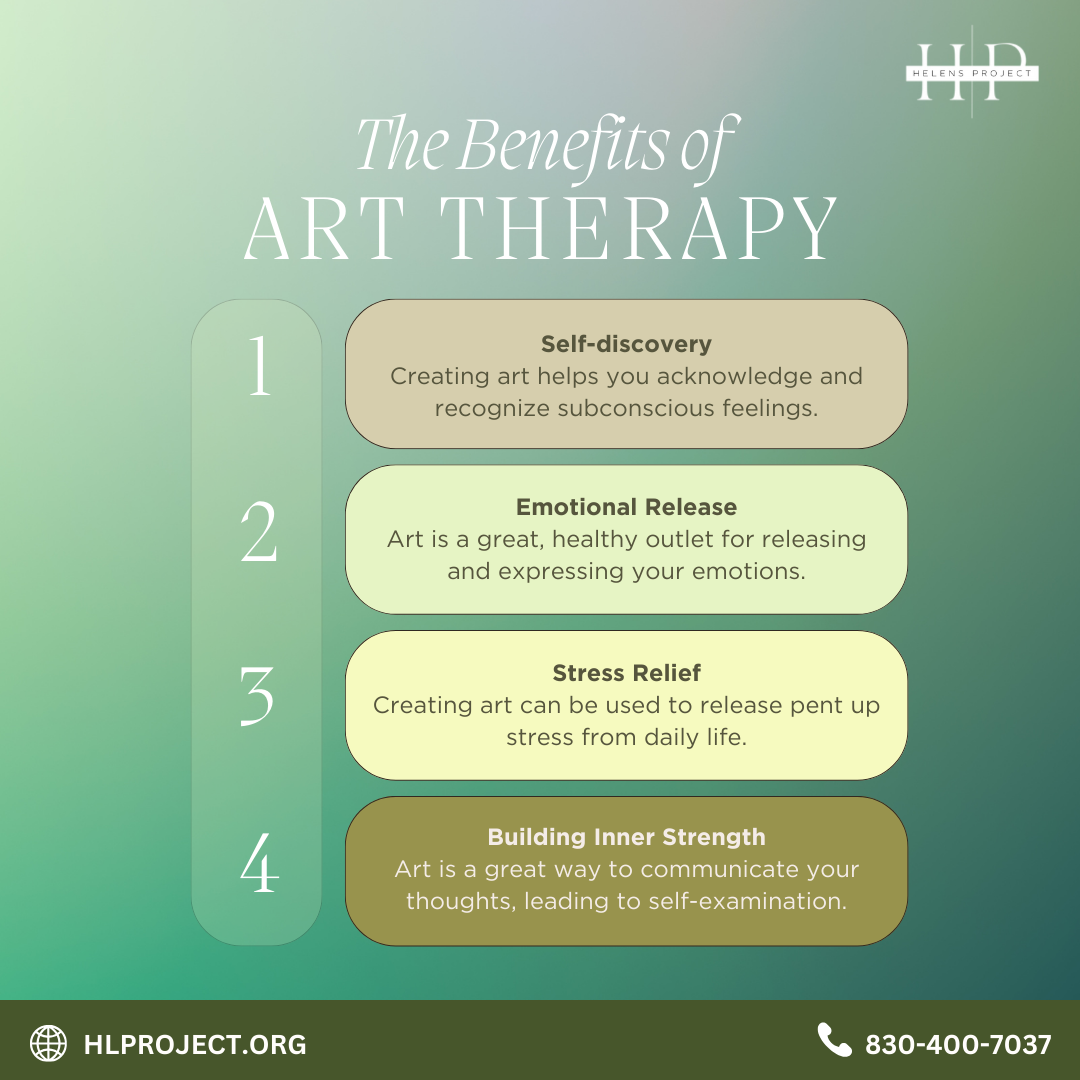
 RSS Feed
RSS Feed